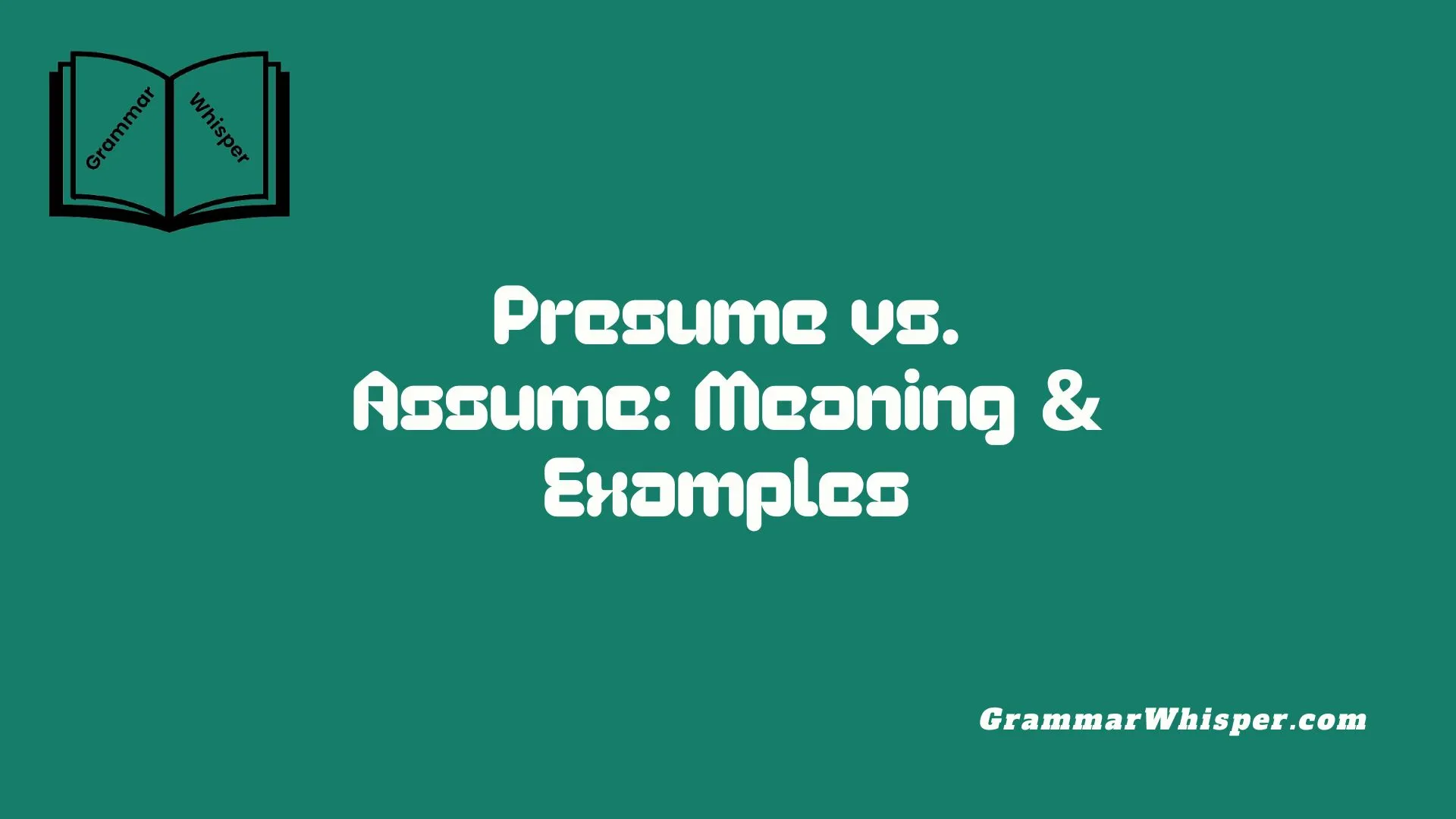Over the years, working with professional teams and reviewing dense academic material has revealed a recurring pattern: many writers, speakers, and presenters often confuse the terms Presume vs. Assume. These words may appear minor, but they carry considerable weight in legal, formal, or business contexts. The difference often hinges on whether you’re making a guess or relying on facts. If you’re drawing from evidence, you might presume. But if you’re making a leap without checking, then you’re likely to assume. This subtle mix of meaning shifts the tone of your sentence, sometimes significantly.
It’s smart to always check which term aligns with your intention before you use it. Whether you’re writing a policy document or preparing a formal talk, picking the wrong word may signal something unintended. For instance, saying “we assume compliance” sounds uncertain, while “we presume compliance” feels more assured and informed. Having edited hundreds of board reports and client emails, I’ve seen firsthand how the words we choose, even when made without much thinking, can either build clarity or lead to confusion. That’s why it pays to review your language closely.
Understanding the Core of Presume vs. Assume
You might not realize it – but precision matters. Saying presume suggests a reasoned belief; saying assume implies you’re flying blind. In a business memo, that difference can shape decisions. In a court case, it may influence justice.
Being intentional about word choice demonstrates credibility, clarity, and care – the pillars of Google E‑E‑A‑T.
What Does “Assume” Really Mean?
The dictionary says assume means to accept something as true without proof. It comes from Latin assumere, meaning “to take upon oneself.”
In daily usage, you might hear:
- “I assume you’re arriving tomorrow.”
- “Don’t assume the meeting went well.”
These examples show how assume conveys guesswork or speculation. You’re essentially saying, “I believe this, though I’m not sure.”
Common Uses of “Assume” in Contemporary Contexts
People assume when they fill gaps in knowledge quickly:
- In conversation: “I assumed you knew already.”
- In email: “I assume you’ll attend the conference.”
- In academic writing: “Assuming X, we find Y.”
This wide usage makes assume a go-to word – but be aware. Without evidence, your statement may seem sloppy or misleading.
Example Sentences Using “Assume” Accurately
- Casual conversation: “I assumed you got the email.”
- Business email: “I assume the data is attached?”
- Academic paper: “Assuming a standard deviation of 5, the model predicts…”
Each use shares uncertainty, signaling a hypothesis instead of fact.
What Does “Presume” Actually Mean?
By contrast, presume means to suppose something is true based on evidence or likelihood. It originates from Latin praesumere: “to take beforehand.”
In practice:
- “We presume innocence until proven guilty.”
- “Given her credentials, we presume she’s qualified.”
Here, presume suggests a reasonable inference – backed by expectation or evidence.
How “Presume” Is Used in Real Life
Check out the legal sphere:
- The U.S. Constitution states we presume innocence.
- Health insurers might presume pre-existing conditions based on records.
Such usage reflects formal or professional tone. With presume, the speaker leans on supporting information, not just guesswork.
Example Sentences Using “Presume” Effectively
- Legal: “We presume the defendant’s right to a fair trial.”
- Business: “We presume you’ve received our previous proposal.”
- Everyday: “I presume you’ll join us at dinner.”
Each sentence implies credibility, grounding your statement on something you trust or anticipate.
Key Differences Between “Assume” and “Presume”
| Assume | Presume | |
| Evidence | No evidence required | Based on some indication |
| Tone | Casual, speculative | Formal, reasoned |
| Legal use | Rare | Common (e.g., presume innocence) |
| Risk | Often wrong guesses | More defensible claims |
Assume says “I think so, but I’m not sure.” Presume says “I believe so, and here’s why.”
Are “Assume” and “Presume” Interchangeable?
Yes – but only when tone isn’t at stake. For casual talk, you can swap them. Yet in legal, academic, or professional writing, choose wisely. Misusing “assume” in a court document undermines authority.
Visual Comparison: Presume vs. Assume
| Factor | Assume | Presume |
| Based on? | No evidence | Prior evidence |
| Tone | Casual | Formal / Assertive |
| Example | “I assumed so.” | “We presume guilt.” |
Psychological & Cultural Implications
Cognitive science shows people assume as a shortcut – filling in missing info quickly. But making that assumption public can spread misinformation. Presumption, on the other hand, signals thoughtful consideration.
In many cultures, fueling assumptions leads to distrust. In professional settings, stating presumed facts demonstrates responsibility.
Idioms and Expressions Using “Assume” or “Presume”
- Assume the position – a command
- Presume too much – overstep boundaries
Idioms intensify meaning – “presume” feels stronger here, hinting at arrogance or authority.
Best Practices for Choosing Between Presume and Assume
Ask yourself:
- Do I have evidence? → use presume
- Is this a guess? → use assume
- Is my tone formal/professional? → lean presume
- Is it a casual chat? → assume works fine
A quick mental checklist helps you avoid unintentional tone shifts.
Final Thoughts
Understanding the difference between presume and assume isn’t just a grammar geek’s pursuit – it’s a skill that sharpens your communication, elevates your credibility, and prevents misunderstandings.
Use assume when you’re making a guess without evidence. It’s common in everyday speech, casual writing, and hypothetical thinking. On the other hand, reach for presume when your belief is based on evidence, probability, or established norms – especially in legal, formal, or professional contexts.
When you choose the right word, you’re doing more than being grammatically correct. You’re signaling that you care about the clarity, tone, and impact of your message. That attention to detail builds trust – in emails, essays, presentations, and beyond.
So the next time you’re about to assume something… pause. Ask yourself: “Am I guessing blindly, or am I leaning on something more solid?” If it’s the latter, presume away. Your reader will thank you for the clarity.
FAQs
Can assume and presume be used interchangeably?
Only in casual settings. In formal or legal writing, they carry different tones and implications.
Is presume more polite than assume?
Yes – presume implies respect, authority, or professionalism, while assume sounds more tentative.
Which word fits better in legal writing?
Always use presume, especially in phrases like presumed innocent or presumed liability.
Are there British vs. American differences?
Minimal. Usage and connotation are nearly identical on both sides of the Atlantic.
How do major style guides treat these words?
Authorities like Oxford, Cambridge, and Merriam-Webster all align as described: assume = guess, presume = inference with basis.











